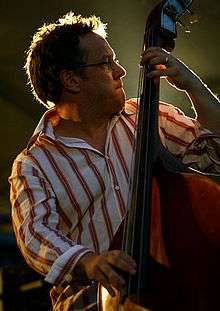Nick Haywood
Nick Haywood is an Australian jazz double bassist, composer, and music educator in Melbourne.
Nick Haywood | |
|---|---|
 Nick Haywood performs at the Midi Jazz Festival 2005 in Beijing, China. Photo by Antonis Shen | |
| Background information | |
| Born | 1961 |
| Genres | Jazz |
| Occupation(s) | Musician |
| Instruments | Double bass |
| Years active | 1989–present |
| Associated acts | Bennetts Lane Big Band |
He has worked with Don Burrows, Dale Barlow, Paul Grabowsky, Bernie McGann, and James Morrison, and with many international jazz musicians, including Nat Adderley, Buddy Greco, Kenny Kirkland, Claire Martin, Jack Parnell, and Mark Murphy. He has been featured on over 100 albums.[1][2][3]
Early life
Born in 1961, Haywood first started playing an electric bass guitar at eight years of age but did not consider undertaking a career as a professional musician. In 1976 he started playing double bass. After finishing school he worked in a brewery and a tin mine.[4]
In his mid 20s he enrolled in a Diploma of Music course at the Victorian College of the Arts and graduated in 1988.
Music career
In 1999 Haywood was nominated for two ARIA Music Awards: for Best Jazz Recording for Sudden in a Shaft of Sunlight by Browne-Haywood-Stevens and Best Adult Contemporary for Beat Club by The Black Sorrows.[3]
The Melbourne International Arts Festival has provided several opportunities to showcase Haywood's composing and performing talents. In 2001 he performed with his band Dodge in the Spiegeltent.[4]
An anniversary concert of John Sangster's Lord of the Rings at the Malvern Town Hall in 2003 also featured Haywood with many of the original musicians.[3]
Haywood, Eugene Ball, and Andrea Keller were the nucleus of the eleven piece Bennetts Lane Big Band which was formed in 2001.[5] The band has been described by the National Library of Australia as "Melbourne's premier large contemporary jazz ensemble" and "comprised of some of Australia's most celebrated improvisers and composers."'[6]
A grant from the Alan C. Rose Memorial Project in 2004 enabled Haywood to study in New York City with American jazz bassists Gary Peacock and Rufus Reid. Later that year he completed a Master of Music Performance degree at the Victorian College of the Arts.[3]
Music education career
Haywood has been a music lecturer in the Performing Arts Department at Northern Melbourne Institute of TAFE (NMIT) since 2001.
With the establishment of the Bachelor of Australian Popular Music course at NMIT in 2007, he became Head of Program/Senior Lecturer in the Department of Music at NMIT. He also teaches privately, and conducts master classes at festivals and institutions around Australia and internationally.
A 2005 agreement between NMIT and the Beijing Midi School of Music, a private music school in Beijing focussing on modern music genres, resulted in Haywood establishing a ten-week music program and teaching the Advanced Diploma of Music Performance to students in Beijing, as well as the opportunity to perform in various Beijing Jazz clubs. He was one of the prominent performers at the 2005 Beijing Jazz Festival.[7][8]
Selected discography
- Allan Browne Quintet – Cyclosporin (Jazzhead, 2004)
- Bennets Lane Big Band – The Snip (ABC Jazz, 2002)
- Blow – Live at Bennett's Lane (Newmarket, 2002)
- Browne Haywood Stevens – King, Dude, Dunce (Newmarket, 1996)
- Browne Haywood Stevens – Sudden in a Shaft of Sunlight (Newmarket, 1998)
- Dodge – Offline (Jazzhead, 2000)
- Hayden Jones – Whisper Not (Newmarket, 1997)
- Jane Clifton – Incommusicado (Mushroom, 1995)
- Lewis and Young Quartet – Desert Storm (Mushroom, 1992)
- Mark Lockett – About Time (Move, 2004)
- Martin Breeze – Strangers (Newmarket, 1999)
- Peter Petrucci Trio – Message from the Past (Move, 1998)
- Robert Burke Quartet – The Edge of Today (Jazzhead, 2005)
- Robert Burke Quartet – Wide Eyed (Jazzhead, 2003)
- The Black Sorrows – Beat Club (Mushroom, 1998)
- The Black Sorrows – New Craze (Mushroom, 1997)
- The York Quintet – A Prayer for the Workin' Cats (Out to Lunch, 1993)
- Tiddas – Tiddas (Mushroom, 1997)
References
- Nick Haywood (Bass) Archived 21 October 2014 at the Wayback Machine The Music Place: Stax of Sax. Accessed 16 November 2008
- Move Records, Nick Haywood, Move Records website artist profile, Accessed 16 November 2008
- http://www.nmit.vic.edu.au/highered/haywood/default.html Archived 20 November 2008 at the Wayback Machine, Northern Melbourne Institute of TAFE website. Accessed 16 November 2008
- Media release, Nick Haywood, Northern Melbourne Institute of TAFE website 5 November 2001. Accessed 16 November 2008
- Jessica Nicholas, Band plays, stays, The Age, 6 February 2008, Accessed 13 November 2008
- National Library of Australia, The snip (sound recording) / Bennette Lane Big Band, Catalogue record, Accessed 13 November 2008
- NMIT Performing Arts Department, NMIT in China, NMIT Performing Arts Department news Blog, 25 May. 2005. Accessed 16 November 2008
- Antonis Shen, Nick Haywood at the 2005 Beijing Jazz Festival, Flickr.com, 15 May 2005. Accessed 16 November 2008
External links
- Nick Haywood at the 2005 Beijing Jazz Festival - Photos by Antonis Shen on Flickr.com